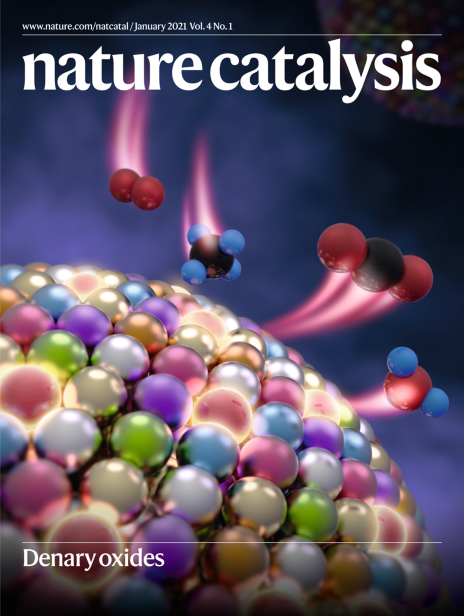Scientists Design and Synthesize Denary Oxide Nanoparticles as Highly Stable Catalysts
Oxide nanoparticles with diverse elemental and structural properties are widely used in catalysis, energy, environmental and biomedical applications. Recently, multi-elemental oxide (MEO) materials, composed of four or more metal cations in a homogeneous phase, have garnered broad attention. The mixing of multiple elements brings new functionality to materials, which exhibit excellent durability in long-term operations as a result of the ‘entropy stabilization effect.’ The composition of existing oxide nanoparticles, however, have been constrained to a maximum of five metal cations and are limited by conventional methods. Typically, conventional approaches adopt relatively low temperature and near-equilibrium conditions for synthesis, which are incapable of efficiently mixing more elements. To that end, a research team in the Department of Materials Science and Engineering (MSE) at the University of Maryland (UMD), College Park, developed a novel strategy to design and synthesize a library of MEO nanoparticles (up to 10 cations) with tunable composition, size and structure. This strategy employs a rapid, non-equilibrium, high-temperature Joule heating method that can greatly expand the compositional space of oxide nanoparticles. The UMD team, together with their collaborators, synthesized a type of denary oxide nanoparticles as the catalyst for methane combustion reactions. Compared to current state-of-the-art catalysts, higher catalytic activity and superior stability were achieved. The study opens a vast compositional space for future development of oxide nanoparticles, and enables high-throughput material synthesis and discovery for many potential applications. The study, led by Liangbing Hu, Herbert Rabin Distinguished Professor and director of the Center for Materials Innovation at UMD, was published on the January 2021 cover of Nature Catalysis. Tangyuan Li, a postdoctoral associate in Professor Hu’s group, served as the lead author on the research paper. “We are very excited for the new opportunities of high entropy catalysts," said Hu. "The mixing rules that we identified by the unique thermal shock synthesis will open up a broad range of new materials compositions that were not possible before.” Chao Wang – an associate professor of chemical and biomolecular engineering at Johns Hopkins University, and one of the study’s corresponding authors – added: "This discovery will open a new revenue toward the design and development of advanced catalytic materials for chemical transformations and energy conversions." Indeed, the high entropy catalyst is already being commercialized through HighT-Tech LLC, a UMD spinoff company with a focus on a range of high temperature technologies. "Our strategy for oxide nanoparticle synthesis displays great promises for materials discovery and optimization in the rarely-explored multi-element space for utilization in many technological fields," said Li. This research was conducted through multi-disciplinary collaboration with research teams at the University of Illinois at Chicago, John Hopkin’s University, the University of Pittsburgh, the University of California at San Diego, and Oak Ridge National Laboratory. For additional information: https://www.nature.com/articles/s41929-020-00554-1
January 11, 2021 Prev Next |


